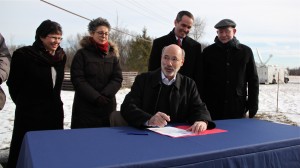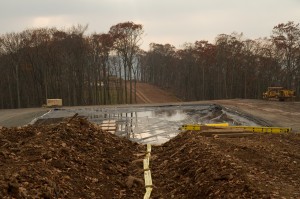Gov. Wolf bans new drilling in state parks and forests
-
Susan Phillips

Emma Lee / WHYY/Newsworks
Gov. Tom Wolf signs an executive order reinstating the moratorium on new leases for oil and gas development in state parks and forests. The event took place at Benjamin Rush State Park in Northeast Philadelphia.
Governor Tom Wolf fulfilled a campaign promise today by reversing course from his predecessor Tom Corbett and imposing a moratorium on leasing any more state park and forest land to Marcellus Shale drillers. Standing in a cold and windy meadow at Benjamin Rush state park, in the northeast section of Philadelphia, surrounded by a handful of state lawmakers, Wolf said he wants the gas industry to succeed but state land should be off limits.
“This is a place where, lets agree, that we can suspend the hostilities,” said Wolf. “In these areas we’re not going to be doing anymore drilling and the purpose of these parks is to allow people to enjoy nature at its best.”
Wolf’s executive order overturns Governor Tom Corbett’s executive order, signed last May. Corbett wanted to open up 25,000 new acres of additional state land to drillers in order to raise $95 million to plug a hole in the 2014-2015 fiscal year’s $29.1 billion budget. Corbett’s order lifted a moratorium put in place by former democratic Governor Ed Rendell just before he left office in 2011.
A total of 700,000 acres of state forest land is available to oil and gas drillers. Under the direction of Governor Rendell, the Department of Conservation and Natural Resources leased 132,000 acres. (Not all of the mineral rights are under state control. About 315,000 acres of state forest land lies above natural gas deposits owned by private leaseholders.) The leases occurred despite opposition from DCNR’s leadership. John Quigley, who Wolf recently appointed to run the Department of Environmental Protection, had fought Rendell on expanding gas drilling when he served in Rendell’s cabinet as secretary of the Department of Conservation and Natural Resources.
Wolf’s executive order does not hamper any current drilling happening in state forests. Rob Boulware is a spokesman for Seneca Resources, a company currently drilling on state forest land. Boulware says industry is heavily regulated no matter where the drilling occurs.
“Exploration companies have demonstrated that oil and gas development can be conducted in an environmentally responsible manner no matter what the location is,” Boulware told StateImpact. “It’s a broad reaching moratorium, and doesn’t allow drilling [even without] surface disturbance. This deprives the Commonwealth of local job creation, tax revenue, and royalties.”
Boulware says Seneca Resources has paid about $7 million a month in royalties to state coffers over the last quarter.
Governor Wolf says his budget won’t reflect any additional royalty income.
“The number in [Corbett’s] budget for this round was initially $75 million dollars, and then was raised to $95 million dollars, said Wolf. “I don’t know where that number came from. I don’t pretend to understand that number. My own budget, which will be unveiled on March 3 will not be assuming those revenues.”

















